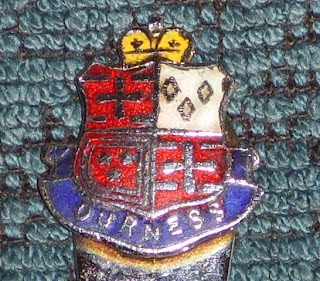I am reluctantly rising to
Peter Black's "First political memory meme" challenge to explain my political activism, when I should be writing articles in anticipation of a general election, among other things.
It became clear only in retrospect that I was brought up in a politically-minded family. My father, and his father before him, came from a strong Labour and trades union background, though there must have been some regard for what Lloyd George did as Liberal chancellor, evidenced by a family holiday in North Wales whose highlight was a visit to Llanystumdwy.
My father's regular army service prevented him from any practical expression of his views. When "bowler-hatted", he lost no time in becoming a Labour councillor.
My mother was not so overtly political, but came from a very Conservative background. She recalled that Frank Owen, soon to become MP for Hereford, once offered her and her sisters a lift to a function they wished to attend, but she was warned by her parents not to have anything to do with those dangerous Liberals.
Early political memories at school were of Lord Citrine (a famous trade union leader of his day, and author of a well-regarded little book on chairmanship) giving a speech whose language was rather too robust for our new headmaster, who obviously had nothing to do with the booking; and a lecture on behalf of the European movement, which convinced both on the political and economic level.
My real political education (in the broadest sense) started with membership of the old CSCA (a predecessor of
the PCS) and consequent annual conferences and summer schools.
I still wasn't committed to any party, but my first adult vote went against the tired and sleazy Conservative administration, and for Labour, inspired by Harold Wilson's rhetoric about the white heat of the technological revolution. Then Wilson appointed
Frank Cousins as Minister of Technology. Some cynicism set in.
Setting up home in Wales and the business of supporting a family by means of absorbing work at DVL meant that there was little time for politics. Besides, though neither Conservatives nor Labour were perfect, there was still general consensus about Europe, public support for education, health and passenger transport (even Labour now thinks this is an extreme "left" position), while the destructive cycle of denationalisation and renationalisation of commercial undertakings had been broken.
Then came Thatcher, Howe, Heseltine and Tebbitt. I could write a further half-dozen paragraphs about how their doctrinaire "greed is good" approach damaged (probably irreparably) public service, and set sections of the community against each other. Indeed, they failed to recognise that communities within the nation exist.
It was time to get off the backside. The Labour Party of "the longest suicide note in history" was out of the question. I joined the Liberal Party one week before the merger with the Social Democrats, and thus became a founder member of the Welsh Social and Liberal Democrats.





